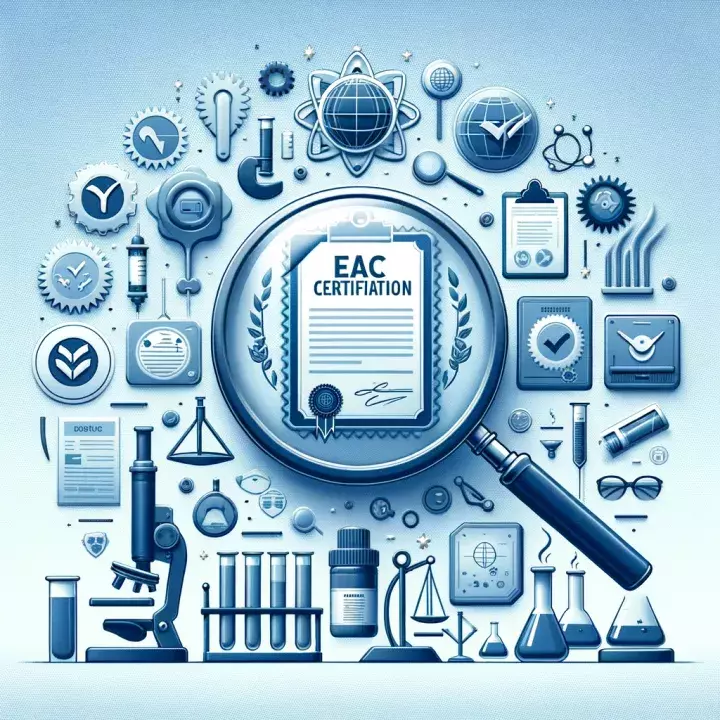
Up to half of all EAC certificates issued may soon be declared invalid. What can be done to prevent this from happening with purchased EAC certificates?
During an inspection of the five largest certification bodies in the Eurasian Economic Union in July 2023, significant deficiencies were found in 46.8% of the audit reports used as a basis for issuing EAC certificates. The analysis of these reports and records showed that not all products listed in the EAC certificates underwent the necessary laboratory testing. Consequently, EAC certificates with proven deficiencies were suspended.
In most cases, the suspension of EAC certificates occurs due to a violation of compliance with the conformity assessment accredited by the certification bodies. Violations of conformity include:- Incorrect or missing laboratory tests
- Lack of competent experts in the certification body
- Lack of complete documentation from the applicant
The main reason that led to the massive revocation of EAC certificates was the lack of documents confirming the import of product samples into the territory of the Eurasian Economic Union, primarily import customs declarations.
The affected bodies whose accreditation was revoked include the “Eurasian Quality Center”, “STC “POZH-AUDIT”, “Certificate-Test”, “LegPromCert” and others.
Starting in 2021, the accreditation service, in collaboration with the customs service, introduced a unified service for tracking the importation of product samples into the territory of the Eurasian Economic Union. If there is no evidence of importation, the accreditation service has the authority to annul the EAC certificate without additional inspections. This system allows the tracing and veryfication of the importation of product samples for the purpose of laboratory testing within the framework of EAC certification in the customs union.
According to the accreditation service, only about 25-30% of issued certificates had proof of having imported product samples. This implies that approximately 70% of conformity certificates may have been issued without the actual importation of product samples and, therefore, without the required testing.
In most cases, EAC certificates issued based on false or without customs declarations are revoked within a few weeks.
By May 2023, the increasing number of questionable goods on the EAEU market prompted the start of mass inspections. These inspections aimed to scrutinize the practices of certification bodies more closely, identify and address the issuance of EAC certificates without proper validation, and ensure compliance with EAEU standards and regulations.
What is product certification and why is it needed?
Products sold on the Eurasian market (Armenia, Belarus, Kazakhstan, Kyrgyzstan, Russia) must be safe for consumers and the environment. In order to confirm the safety of the products, there are specific procedures to be followed.
Let's take a closer look.
By definition - the correct name for the procedure is "conformity assessment”. This assessment can take different forms - EAC-Certification or EAC-Declaration of goods.
It is important to understand that during the circulation of a product on the market - that is, from the moment the product is produced or imported into the Eurasian market, absolutely all participants in the process of selling the product are responsible for its compliance with safety requirements. Meaning, it doesn’t matter whether you produce, import, or sell products - you are responsible for its safety, in some cases, not only with money, but also with your own freedom.
The verification and revocation of EAC certificates are conducted by special commissions established by the accreditation service. These commissions are tasked with test reports and EAC certificates, initially focusing on cables and industrial electrical products, and extending to children's products since mid-2023.
Depending on the type of product, the process is regulated by Technical Regulations of the Eurasian Union, of which 52 have currently been adopted and a number more are at the stage of development, all in coordination and adoption at the level of the Eurasian Economic Union.
Technical Regulations determine mandatory requirements for products such as type examination, that ensure their safety for both the consumer and the environment. The requirements of Technical Regulations apply to a wide range of products, from underwear to high-speed trains.
Certificates and declarations of conformity of products with regulatory requirements are needed by manufacturers to release them into free circulation, importers of products to import them, and final sellers to sell them to consumers.
Why is this crucial for product manufacturers and suppliers?
When a certification body loses its accreditation as a result of an audit, this leads to the invalidation of all EAC certificates issued by that body, and there have been multiple instances of this occurring. This underscores the critical importance of not bypassing the obligation to provide product samples for testing, even if the certification body offers to "save money" in such a manner.
In cases where violations are identified, manufacturers and importers may face fines, suspension, or annulment of their EAC certificates, as well as product recalls. According to article 16.3 of the Code of Administrative Offenses of the Russian Federation, the fine for presenting invalid documents or non-compliance with import bans and restrictions ranges between 500 to 3,000€ Euros. Additionally, if the use of prohibited low-quality products leads to serious health damage, a prison sentence of up to 6 years can be imposed.
Certification bodies found issuing counterfeit documents are subject to inspections and risk losing their accreditation, which affects the validity of all certificates they have issued.
Opting for shortcuts in the conformity assessment process can lead to significant long-term costs. Furthermore, unscrupulous certification bodies might resort to using so-called "paper laboratories," which lack adequate equipment and engage in the falsification of test reports.
How to avoid the revokement of an EAC certificate?
Despite the high demands on skills and equipment placed on accredited certification bodies, testing laboratories and their experts, it is often difficult to select a trustworthy body or laboratory based solely on publicly available information.
Particular caution should be taken with providers who offer low prices, aggressive advertising campaigns or contracts through dubious letterbox companies. It is important to carefully examine the documentation of accredited bodies and read reviews. Insist that all necessary procedures and tests be carried out properly. Be skeptical of offers that promise a “simplified process without additional costs and formalities.” It may be helpful to ask for photo evidence of the tests. Make sure product samples are imported legally and in compliance with all customs regulations to avoid high costs.
To reduce risks, pay particular attention to the following:
- Availability of registration in the national part of the register
- Recommendations from other customers in the same industry
- Transparent ownership structure
Before concluding a contract and making payments, it is essential to verify the authenticity of the documents from both the certification body and the testing laboratory. It is advisable that contractual agreements for the certification work be concluded directly with the certification body, rather than through an unknown intermediary. This ensures that all processes are transparent and traceable.
If a contract is concluded through an intermediate body and a certificate is revoked due to the fault of the certification body, there will usually be no one from whom you can demand an explanation. Compliance with these conditions does not guarantee that everything will go according to plan, but it significantly reduces the risks.
How can we help?
In this rapidly changing regulatory environment, Schmidt & Schmidt offers comprehensive support for exporters to the EAEU countries. Our service portfolio includes EAC certification, customization to specific product categories and tailored solutions to comply with the technical and legal requirements of these markets. We are committed to making it easier for companies to enter and expand in these regions by providing the most up-to-date information and guidelines.
Technical expertise, care and accuracy in the preparation of documents are the prerequisite for problem-free distribution and use of products, machines or systems in the EAEU territory. The technical documentation must also be written in Russian or in the official language of the respective member country in which the product is to be sold or used. In order to avoid any problems, we will be happy to help you create new technical documents or check existing documents for completeness and linguistic and terminological correctness in Russian.
Thanks to their many years of experience, our experts can also provide you with specific industry knowledge from plant engineering, mechanical engineering, metal construction, measurement technology, electrical engineering, automation technology, medical technology, food technology and the furniture industry.
What is an EAC Certification?
In our video, we explain what an EAC Certification is and how and where to certify or declare your products for the introduction on the EAEU market.
The EAC Certification and the EAC Declaration are complex procedures that attest your products the conformity with the technical regulations of the EAEU and require a lot of know-how. Schmidt & Schmidt will support you with the certification of your products for the EAEU market.





